Search
AOC's questions years ago helped spark the investigation into Trump's business. Now, he's been ordered to pay $355 million.
In 2019, Alexandria Ocasio-Cortez questioned Michael Cohen about Donald Trump. Cohen's answers eventually led to Letitia James's fraud lawsuit.

Broward cities concerned New River tunnel-bridge dispute will delay commuter rail buildout
The dispute between Broward County and the city of Fort Lauderdale over the choice of a tunnel or bridge for the New River railroad crossing has raised concerns among other cities that a long-await…

What is no-fault divorce, and why do some conservatives want to get rid of it? | CNN
Though no-fault divorce was first legalized more than 50 years ago, it has long been sneered at in conservative circles, who see it as a danger to the sanctity of marriage and the concept of the American family.

DeSantis Faces Critical Decision on Cruise Ships in Key West
A campaign donor to Gov. Ron DeSantis wants to expand cruise ship operations in Key West, where voters have tried to restrict them.

‘I would do it all over again:’ State Rep. Armando Walle of Houston defends profanity-laced tirade about proposed immigration laws
Walle, a Democrat and Latino, called out a Republican state lawmaker for successfully ending debate about a proposed law that would allow any police officer in Texas to deport someone who is in the United States illegally.
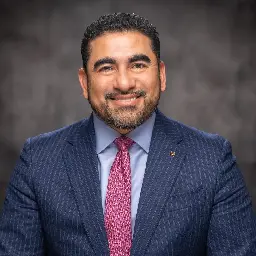
Americans' faith in institutions has been sliding for years. The chaos in Congress isn't helping
For many Americans, the Republican dysfunction that has ground business in the U.S. House to a halt as two wars rage abroad and a budget crisis looms at home is feeding into a longer-term pessimism about the country’s core institutions.
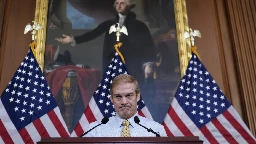
WASHINGTON (AP) — For many Americans, the Republican dysfunction that has ground business in the U.S. House to a halt as two wars rage abroad and a budget crisis looms at home is feeding into a longer-term pessimism about the country’s core institutions.
The lack of faith extends beyond Congress, with recent polling conducted both before and after the leadership meltdown finding a mistrust in everything from the courts to organized religion. The GOP internal bickering that for nearly three weeks has left open the speaker’s position — second in line to the presidency — is widely seen as the latest indication of deep problems with the nation’s bedrock institutions.
“They’re holding up the people’s business because they’re so dysfunctional,” said Christopher Lauff, 57, of Fargo, North Dakota.
Part of that business, he said, is approving money for Ukraine to continue its fight against Russia’s invasion, something he says ultimately helps the U.S. — a point President Joe Biden stressed Thursday during an Oval Office address.
Two Families Got Fed Up With Their States’ Politics. So They Moved Out.
The Nobles of Iowa moved to blue Minnesota. The Huckinses of Oregon moved to red Missouri. Their separate journeys, five weeks apart, illustrate the fracturing of America.

McCarthy’s Speakership Is in Jeopardy as Gaetz Renews Threat to Oust Him
Speaker Kevin McCarthy faces a major test of his leadership in the days ahead, after one of his loudest Republican critics in the House reiterated a promise to try to remove him from his post.
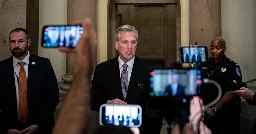
Both parties rally supporters as early voting begins in Virginia's closely watched legislative elections
Early voting has begun in Virginia's costly, high-stakes and closely watched legislative elections after a week in which elected officials and candidates rallied their supporters across the state.

How a Little-Known Group Helped Resurgent Democrats Wield Power
For decades, Republicans have had a far more robust network of conservative policy groups to push their legislative agenda. Now the States Project is aiming to fill that void on the left.

Speaker McCarthy is running out of options to stop a shutdown as conservatives balk at a new plan
House Speaker Kevin McCarthy is running out of options as he tries to press forward with a plan to keep the federal government from shutting down.
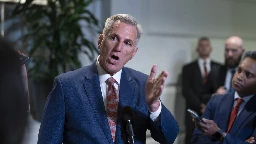
WASHINGTON (AP) — Speaker Kevin McCarthy was running out of options Monday as he pushed ahead with a plan to keep the federal government from shutting down, but even including hardline border security provisions wasn’t enough to appease the far-right flank in his Republican House majority.
The speaker is trying to convince his Republican conference that there will heavy political fallout from a shutdown as he plows toward a vote to pass a stopgap measure, called a continuing resolution, that would keep government offices open past the Sept. 30 deadline. GOP leadership is preparing for a vote by Thursday, but McCarthy is warning he’ll keep House lawmakers in Washington into the weekend. Regardless, many are already bracing for a weeks-long shutdown.
“I’ve told all of Congress you’re not going to go home. We’re going to continue to work through this,” McCarthy said Monday at the Capitol. “Things that are tough sometimes are worth it.”
He also suggested that time is still on his side and panned the idea of compromising with Democrats as he tries to pass the annual spending measures on his own, saying there were “a lot of good ideas” still coming from Republicans.
Republican legislatures flex muscles to keep power in closely divided North Carolina and Wisconsin
In North Carolina and Wisconsin, Republicans are trying to seize power over elections and redistricting.
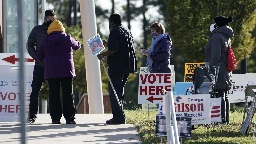
RALEIGH, N.C. (AP) — In 2020, North Carolina seemed the model of an evenly-divided swing state. Then-President Donald Trump barely won, beating Democrat Joe Biden by just over a percentage point. Meanwhile, the state’s Democratic governor, Roy Cooper, won reelection by a relatively comfortable 5 points.
Even last year, as Republicans won two seats on the state Supreme Court, North Carolina’s congressional delegation split evenly between Democrats and the GOP.
But it’s the Republican Party that is making the decisions in the state, thanks to recent seat gains in the legislature and aggressive stances from GOP lawmakers. It has passed voting changes over Democrats’ objections and this week could vote to wrest power from the governor over how the state’s elections are run.
In both cases, Republicans are expected to override the governor’s veto thanks to their legislative supermajorities.
There's no sign of widespread COVID-19 mandates in the US. Republicans are warning of them anyway
Republicans are responding to a late summer spike in COVID-19 by raising familiar fears that government-issued lockdowns and mask mandates are on the horizon.

NEW YORK (AP) — As Americans fend off a late summer COVID-19 spike and prepare for a fresh vaccine rollout, Republicans are raising familiar fears that government-issued lockdowns and mask mandates are next.
It’s been a favorite topic among some of the GOP’s top presidential contenders. Florida Gov. Ron DeSantis told reporters that people are “lurching toward” COVID-19 restrictions and “there needs to be pushback.” South Carolina Sen. Tim Scott posted online that the “radical Left” seeks to bring back school closures and mandates. And former President Donald Trump urged congressional Republicans to stop the Biden administration from bringing back COVID-19 “mandates, lockdowns or restrictions of any kind.”
“The radical Democrats are trying hard to restart COVID hysteria,” Trump told supporters in Rapid City, South Dakota, during a recent campaign stop. “I wonder why. Is there an election coming up by any chance?”
While some individual schools and colleges have implemented temporary mask requirements, there is no sign that anyone in federal or state leadership is considering widespread COVID-19 restrictions, requirements or mask mandates. The administrations of several Democratic governors denied that any such moves are even under discussion. The overriding sentiment is to leave the decisions to individuals.
The End of Roe Is Having a Chilling Effect on Pregnancy - Lauren Leader, Politico
New polling shows that a third of young women say they or someone they know has decided not to get pregnant because of concerns about maternal health care after Dobbs.

> > > The end of Roe v. Wade in June 2022 has had a profound effect on maternal healthcare and abortion access across the country. Fourteen states have now completely banned abortion and two dozen more have bans at 22 weeks or less. As a result, an already grim maternal health care landscape has worsened. > > > > New data reveals an unexpected consequence of these developments: Young women, even those in states where abortion remains legal, say they are foregoing having children because they are afraid to get pregnant because of changes that followed the Dobbs decision that ended Roe. > > > > Polling conducted in August by my organization, All In Together, in partnership with polling firm Echelon Insights found that 34 percent of women aged 18-39 said they or someone they know personally has “decided not to get pregnant due to concerns about managing pregnancy-related medical emergencies.” Put another way, poor or unavailable maternal health care post-Dobbs is leading people to alter some of their most important life choices. > > > > For young people, the maternal healthcare crisis is deeply personal. More than a third of young people and 22 percent of young women told us they have personally dealt with or know someone who has “faced constraints when trying to manage a pregnancy-related emergency.” And 23 percent of 18- to 39-year-old women say they have themselves or know someone else who has been unable to obtain an abortion in their state — a number almost three times higher than respondents in other age groups. > > > > Perhaps most surprisingly however, these results are similar regardless of whether the respondents are living in states with abortion bans or states without restrictions on abortion access. The consistency between red and blue states suggests that the statistics on maternal mortality and the stories and struggles of women navigating the new normal on abortion access have penetrated the psyche of young people everywhere. The Dobbs decision, it seems, has fundamentally altered how people feel about having families and the calculus for getting pregnant. > > > > Alexis McGill Johnson, CEO of Planned Parenthood, told me that the stories of women dying or facing near-death experiences because of abortion restrictions has struck fear in the hearts of young people, many of whom were already ambivalent about having children because of the costs and pressures that generation faces. > > > > “Abortion bans make pregnancy less safe,” she said, “and women are acutely aware of the consequence of restricting access to reproductive health care in their own lives.” > > > > In the wake of Dobbs, stories of women enduring horrific medical trauma in states where abortion is illegal have been widely reported. For instance, Carmen Broesder, an Idaho mom, documented her 19-day long harrowing miscarriage on TikTok – including her three trips to the emergency room. While only six weeks pregnant, she was denied access to a D&C (dilation and curettage) surgery because of Idaho’s abortion ban. > > > > It goes almost without saying that this is not good news for the already declining birthrates in the U.S. According to research from Pew, birthrates in the U.S. had been falling since the early 2000s and plummeted during the Covid pandemic. Fertility rates briefly rebounded after the pandemic but now, post-Dobbs, they have dropped again. > > > > Should this trend continue, the reluctance of young women to have children now will have vast and long-term consequences for the American economy and fabric of the nation. Falling birth rates can affect everything from tax revenue to labor force participation, schools, housing, elder care and more. > > > > But beyond the macro-economic ramifications, there is also a human and emotional toll for people who may want children but are too afraid to have them. The hallmark of a flourishing society is one where people can fulfill their hopes and dreams, and for many, those dreams include raising a family. But for a generation of Americans, that dream now appears frustrated. Gen Y and Z Americans report higher rates of mental health challenges and stress than other generations. The Dobbs decision has clearly contributed to that anxiety. > > > > All of this signals troubling, unexpected and ominous continuing consequences of the Supreme Court’s deeply unpopular Dobbs ruling and the ripple effects that abortion bans, which polls show a majority of Americans oppose, have created. It’s a trend worth watching and weighing – for lawmakers, for women, for families and for all Americans. > >
Workers Are About To Get Way More Power. Here's How.

YouTube Video
Click to view this content.
The National Labor Relations Board could soon make it much easier for workers to unionize. The board plans to re-establish the Joy Silk Doctrine, which would force employers to recognize and bargain with their employees' union if a majority of workers sign authorization cards.
This would turn the tables in favor of workers and eliminate a key union-busting tactic employers use to stifle organizing. By enabling workers to unionize via card check and preventing employers from dragging out the process into a time-intensive union election, the decision would make it vastly easier for workers to win a union.
Steven Greenhouse explains. Greenhouse is a journalist and the author of The Big Squeeze and Beaten Down, Worked Up: The Past, Present, and Future of American Labor.
Why Putin’s Russia cannot accept its borders
Vladimir Putin's attempts to justify the invasion of Ukraine as a just war to reunite historically Russian lands reflect the expansionist ideology at the heart modern Russia's imperial identity, write Glenn Chafetz and John Sipher.

> > > Vladimir Putin's attempts to justify the invasion of Ukraine as a just war to reunite historically Russian lands reflect the expansionist ideology at the heart modern Russia's imperial identity, write Glenn Chafetz and John Sipher. > > > > To understand Russia’s current obsession with Ukraine, it is important to recognize that Russia was never a state in the common usage of the term. Unlike the modern Turkish state that emerged from the Ottoman Empire, or Great Britain, which acquired and lost an empire, Russia never had an identity separate from empire. As British historian Geoffrey Hosking observed, “Britain had an empire, but Russia was an empire.” > > > > The Kremlin’s preferred narrative of Russia rising from present-day Ukraine (“Kyivan Rus”) is a Moscow-concocted fairy tale. The officially endorsed 1000-year history of Russia is a self-created and self-perpetuated myth that generations of Russian dictators have promoted to justify their external expansion and internal repression. > > > > Instead, what we think of today as Russia started out as a loose collection of independent city states that included Novgorod, Pskov, Smolensk, Tver, and Moscow, the last of which attained particular significance toward the end of Mongol rule a little over 500 years ago. Kyiv was no more a part of Russia then than it is now. There was no common language, no common administration, and no joint identity. Indeed, it would be centuries before the rulers of Muscovy attempted to assert their dominance over Kyiv and the lands of today’s Ukraine. > > > > It was the era of Mongol rule and not the Kyivan Rus inheritance that paved the way for the rise of the Russian Empire. Under Ivan III (“The Great”), Muscovy established itself as the strongest of the city states to emerge from the Mongol period. Ivan called himself “Tsar of all Rus,” but he was actually more like the mayor of Greater Moscow. It was Ivan who started the expansion of Muscovy, initiating the so-called “gathering of Russian lands.” His expansionist vision has been embraced by virtually every subsequent ruler of Muscovy, the Russian Empire, the Soviet Union, and the Russian Federation. > > > > Ivan III’s quest to acquire new territories, often under the guise of “reuniting the lands of the ancient Rus,” continues to this day and has had a profound impact on world history. As Historian Stephen Kotkin has noted, “Beginning with the reign of Ivan the Terrible in the sixteenth century, Russia managed to expand at an average rate of fifty square miles per day for hundreds of years, eventually covering one-sixth of the earth’s landmass.” > > > > Few of the peoples inhabiting the lands Ivan III and his successors claimed saw themselves as Russian, at least not before they were “gathered.” At the time of Ivan III’s death, Muscovy covered less than a fifth of the area of today’s Russia; notably, it did not include the territory of modern Ukraine, Belarus, the Caucasus, or all of Siberia. Crimea, about which Vladimir Putin rhapsodizes, was not part of the Russian Empire until Catherine II took it from the Crimean Khans in 1783. > > > > If Putin is concerned with righting historical wrongs, he should give Crimea back to the Crimean Tatars. He won’t do this, of course, because the dynamic of imperial conquest and Russification is a key component of legitimacy for Putin, as it has been for almost all of Russia’s rulers (Yeltsin and Gorbachev partially excepted). Russia expands because its rulers need an external threat to justify their autocracy. This was as true for the Soviet period as it had been for Ivan the Terrible, Peter the Great, and Catherine the Great. > > > > Putin’s Russia laments the loss of imperial glory, and has never come to terms with its repressive past. The security-expansion paradox driving Russia’s foreign and domestic policies is a vicious cycle that all empires experience to one extent or another. Acquisition creates threats inside the newly acquired territories and on the expanding borders of the growing empire. Expansion demands inward Russification and repression, and further outward expansion. As Catherine the Great famously said, “I have no way to defend my borders but to extend them.” > > > > This dynamic can end in two ways: Either through external containment or internal democratization. The latter has proved problematic for the Russian people, and is not something Russia’s neighbors should count on happening any time soon. The former has worked before, during the Cold War. > > > > Modern Russia remains an empire and does not see itself as a Great Power unless it dominates its neighbors. Consequently, Russia will continue to threaten, attack, and absorb its neighbors until the West acts collectively to contain it. > > > > Russia and its apologists will complain that containment ignores Russia’s legitimate security concerns. This is a canard because Russia’s security concerns constantly expand. In reality, Russian leaders have absolutely nothing to worry about if they return to their country’s internationally recognized 1991 borders. The West has always respected these borders; it is Russia that has not. Until modern Russia moves beyond its deeply ingrained imperial identity, this is unlikely to change. > >
The failed Ohio amendment reflects Republican efforts nationally to restrict direct democracy
Despite this past week’s thrashing at the polls, Republican lawmakers in Ohio have vowed to try again to pass a measure making it harder to change the state's constitution.

COLUMBUS, Ohio (AP) — After Ohio voters repealed a law pushed by Republicans that would have limited unions’ collective bargaining rights in 2011, then-GOP Gov. John Kasich was contrite.
“I’ve heard their voices, I understand their decision and, frankly, I respect what people have to say in an effort like this,” he told reporters after the defeat.
The tone from Ohio Republicans was much different this past week after voters resoundingly rejected their attempt to impose hurdles on passing amendments to the state constitution — a proposal that would have made it much more difficult to pass an abortion rights measure in November.
Many transgender health bills came from a handful of far-right interest groups, AP finds
Legislation to restrict gender-affirming care is often pre-written and shopped out by a handful of interest groups. So-called model legislation has been used in statehouses for decades.

Aaron and Lacey Jennen’s roots in Arkansas run deep. They’ve spent their entire lives there, attended the flagship state university, and are raising a family. So they’re heartbroken at the prospect of perhaps having to move to one of an ever-dwindling number of states where gender-affirming health care for their transgender teenage daughter, Sabrina, is not threatened.
“We were like, ‘OK, if we can just get Sabrina to 18 ... we can put all this horrible stuff behind us,’” Aaron Jennen said, “and unfortunately that’s not been the case, as you’ve seen a proliferation of anti-trans legislation here in Arkansas and across the country.”
At least 17 states have enacted laws restricting or banning gender-affirming care for transgender minors, though judges have temporarily blocked their enforcement in some, including Arkansas. An Associated Press analysis found that often those bills sprang not from grassroots or constituent demand, but from the pens of a handful of conservative interest groups.
Political violence in polarized U.S. at its worst since 1970s
In contrast to the 1970s, much of today's political violence is aimed at people, not property. And most deadly attacks tracked by Reuters come from the right--such as a Trump fan who shot a neighbor.

OKEANA, Ohio - As Kristen King’s husband lay dying in their yard from three gunshots to his head, the 911 operator asked her: Did she know who killed him – or why?
Sobbing, King identified the shooter as her neighbor in the small Ohio town of Okeana. “His name is Austin Combs,” she stammered. “He’s come over, like, four times confronting my husband because he thought he was a Democrat.”
Then she broke down. “Why?” King wailed on the 911 recording, struggling for breath. “He’s the love of my life!”
The Nov. 5 killing of Anthony King was among 213 cases of political violence identified by Reuters since the Jan. 6, 2021, attack by supporters of former President Donald Trump on the U.S. Capitol. Three academics who reviewed the cases say they add to growing evidence that America is grappling with the biggest and most sustained increase in political violence since the 1970s.
Republicans are talking up the possibility of impeaching Biden. Is it what voters want to hear?
Republicans are energizing GOP voters with ongoing U.S. House probes on Hunter Biden and the threat of an impeachment inquiry into President Joe Biden's family finances.

SANTA CLARITA, Calif. (AP) — Bill Mehlem recalls a time when his politics generally aligned with conservatives, enthusiastically backing Republicans such as John McCain during his 2008 presidential campaign.
But the stay-at-home dad has grown dismayed with the tempestuous GOP molded by former President Donald Trump, who is now seeking a return to the White House. And the threat of a Republican-led impeachment inquiry into President Joe Biden’s family finances and the churning U.S. House probes of his son, Hunter Biden, have left Mehlem indignant, angry and remembering why he’s a political independent.
“It’s all about revenge politics to keep Trump’s base” engaged for the 2024 elections, Mehlem said. “It’s all about nothing.”